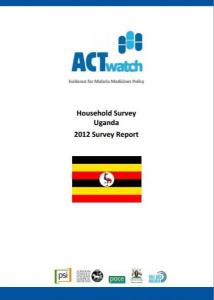Household Survey Report Uganda 2012
The objective of this household survey was to monitor consumer treatment-seeking behavior for fever in children under five, including
- Types of medicines (specifically, antimalarials) and diagnoses obtained
- Sources visited for advice
- Treatment and diagnosis
- Price paid for antimalarials
- Caregiver knowledge and awareness of fever symptoms and antimalarials
This study uses data from a cross-sectional household survey of children’s caregivers. The household survey was designed to monitor all key malaria treatment indicators, as well as additional indicators addressing sources of treatment for fever, antimalarials and diagnostics.
Source: PSI, Rollback Malaria
Date of Publication: March 25, 2019
SIMILIAR RESOURCES
Tools
Examples
- Guidance on Social and Behavior Change for Family Planning During COVID-19
- Conseils sur le changement social et de comportement pour la planification familiale pendant le COVID-19
- Gapminder
- Desk Review of Programs Integrating Family Planning with Food Security and Nutrition
- Zika Virus Global Emergency Response Plan
- La Planification Familiale dans les Situations d'Urgence: Essentielle,, Voulue, Necessaire et Realisable
- Early Impacts of the COVID-19 Pandemic: Findings from the 2020 Guttmacher Survey of Reproductive Health Experiences
- SWOT Analysis: Strengths, Weaknesses, Opportunities, and Threats
- Promoting Quality Malaria Medicines Through SBCC: An Implementation Kit
- Malaria Indicator Survey Sample Household Questionnaire
- Situation Analysis of Nutrition in Southern Sudan: Analysis Based on June 2009 Assessment
- Situation Analysis of Behavior Change Communication Activities in Bihar
- MSM + HIV + Africa
- Health Communication Component Endline Survey
- Schistosomiasis Situation in Uganda: A Review of Knowledge, Attitudes and Practices (KAP) associated with Schistosomiasis Infection and Prevention

